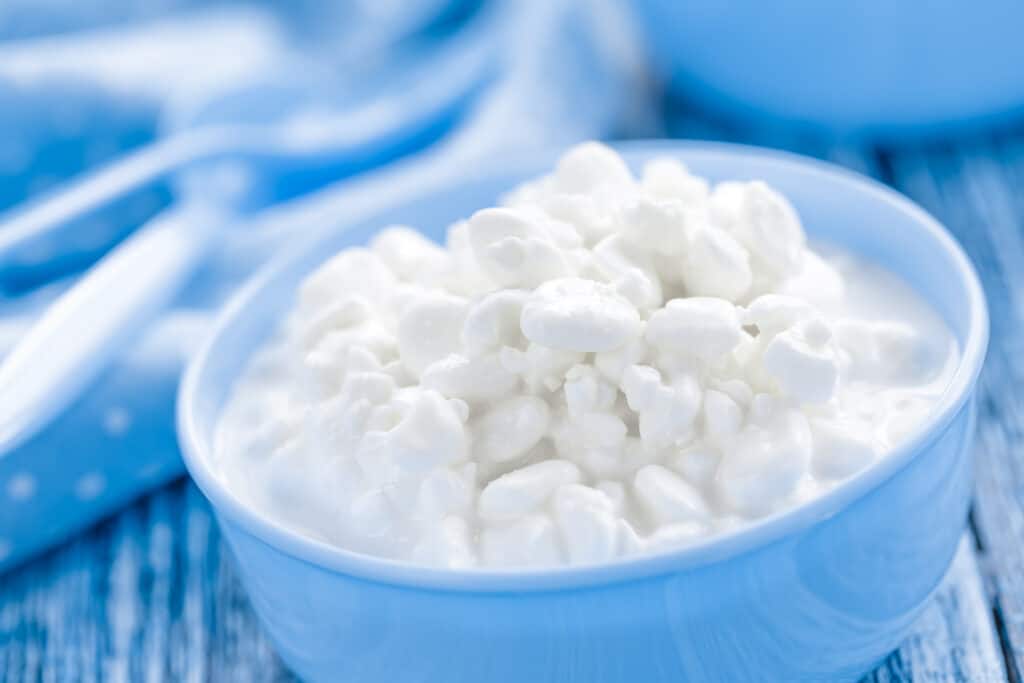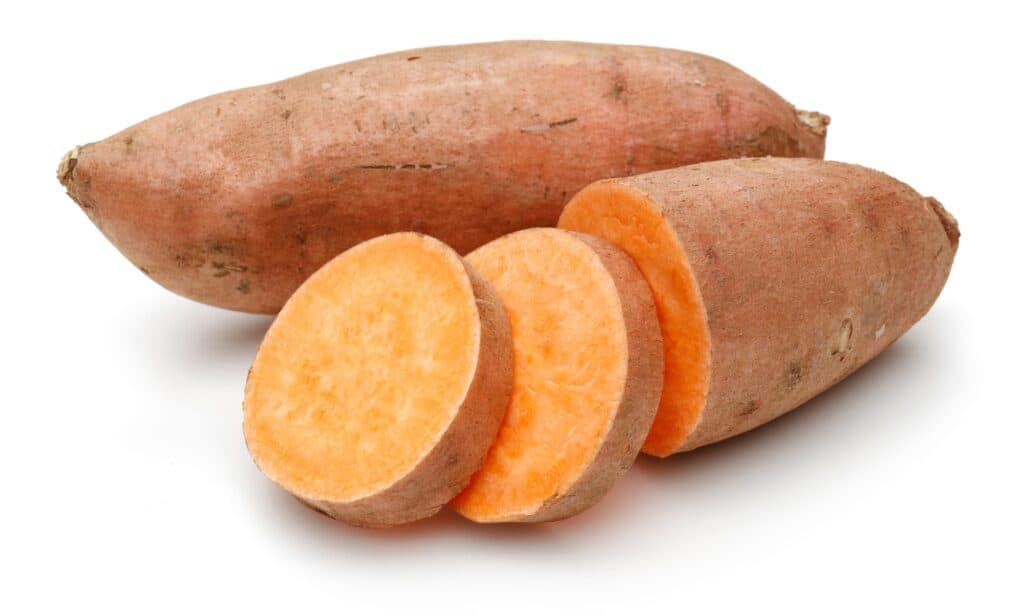Cottage cheese is an everyday food that’s tasty and low in calories, but can dogs eat cottage cheese too? They certainly like the smell of it!
Let’s take a closer look to determine if cottage cheese is a suitable choice for our canine friends.
Is Cottage Cheese Safe for My Dog to Eat?
Dog owners often wonder whether or not cottage cheese is safe for their pooch and the answer is generally yes; cottage cheese is safe for dogs to eat unless they are lactose intolerant. This is good news because dogs universally love cheese. The rustle of a cheese wrapper is enough to wake a dog from full sleep!
However, cottage cheese is often sold with added ingredients, and some of those additions are not dog safe. Dogs should not be fed cottage cheese that contains nuts, grapes, raisins, chocolate, onions, garlic, chili or spices, as these could pose health risks to your pet.

iStock.com/YelenaYemchuk
Is Low-Fat Cottage Cheese Safe for Dogs to Eat?
Cottage cheese is a fatty food that can pile on the pounds and increase the chances of your dog becoming obese, threatening their health. Therefore, low-fat cottage cheese is a better choice for Fido. Be aware, however, that low fat varieties can contain more sodium, or salt. If your dog has or is susceptible to hypertension, avoid low-fat cottage cheese unless it’s a reduced-sodium variety.
Symptoms of Lactose Intolerance in Dogs
Cottage cheese doesn’t have a lot of lactose in it compared to milk, but if your dog has an intolerance it may cause symptoms even if it’s just a teaspoon full.
Symptoms of lactose intolerance in dogs include:
- Diarrhea
- Vomiting
- Bloating
- Gas
- Whimpering from stomach cramps
- Lethargy
- Loss of appetite
If you don’t know whether not your dog is lactose intolerant, start by giving them a small amount of cottage cheese, and then wait at least a day before feeding them more.
If your dog shows signs of intestinal discomfort, it would best to avoid dairy products in the future. This includes all types of cheese, milk, and yogurt.
Curing Stomach Upset in Dogs
An upset stomach in a dog is uncomfortable for them and can cause messy accidents in the house and yard. If your dog has an upset stomach, serve them bland foods for a day or two until their stool firms up.
Foods like chicken and rice or turkey and sweet potato all get your pooch on the road to recovery. Always provide lots of cool, fresh water to avoid dehydration, which can be an issue with diarrhea.

iStock.com/MahirAtes
What Is Cottage Cheese?
Cottage cheese is also known as curds and whey. It’s a soft-curdled cheese that predates solid cheese.
Cheese making is thousands of years old. There are Mesopotamian temples dating to the year 3000 BC with the process of making a salt-filled curd mixture carved into the walls, but archaeologists aren’t sure exactly who made the first cheeses and when. Some experts suggest it could date back to the Middle East as early as 5000 BC!
Today, cottage cheese is valued for its high protein, low-fat attributes. Vegetarians use it in place of meat and dieters combine it with low-fat crackers, fish, or fruit to reduce calorie intake. Although yogurt has replaced it in popularity since the mid 1980s, cottage cheese continues to be well-loved.
Though it’s been around for thousands of years, cottage cheese got its name during the mid-19th century because it was a simple cheese that could be made on a homestead, or cottage, without complicated equipment.
Can Dogs Eat Hard Cheese?
Dogs can eat hard cheese, but be aware that it’s fattier than cottage cheese, so a small amount goes a long way. Overfeeding your pet can lead to obesity, shortening their lifespan.
Can Dogs Eat Bleu Cheese?
Dogs cannot eat bleu cheese. The blue parts of bleu cheese area fungus that produces roquefortine C, which can make dogs very unwell, resulting in vomiting, diarrhea, and seizures.

iStock.com/igorr1
Is Cottage Cheese Healthy For Dogs?
Cottage cheese can be a healthful addition to your pup’s diet. The health benefits of cottage cheese for dogs include:
- Protein. Protein is important for muscle growth and maintenance and it is satiating, which means your dog will feel fuller longer. If your pup is dieting, then protein-filled, low-fat cottage cheese is a splendid choice that will stave off hunger pains.
- Calcium. contributes to strong doggy teeth and bones, just like in humans.
- Magnesium. This vital mineral builds cells and improves energy levels. A magnesium deficiency can lead to tremors and heart murmurs
- Vitamin A. Vitamin A is known as retinol, it’s essential for healthy eyes and skin but it also contributes to the immune system
- Probiotics. These could be a good way to boost stomach cultures, improve gut health and your dog’s immune system but further research is required. Check the packaging to see if it contains live and active cultures.
- Low Fat. Some versions of cottage cheese are low fat, if your dog is dieting or you’re keen to keep them fit, low fat cottage cheese is a tasty treat.
- It’s tasty. Dogs love to sniff and eat, if your dog eats fairly bland dry food as their main nutrition, some tasty cottage cheese can add interest to their meal.
Does Cheese Give Dogs Worms?
The myth that cheese gives dogs worms, though completely without merit, is one that has stuck around for a long time! Feeding your dog cheese will not result in worms!
How / When Can My Dog Have Cottage Cheese?
Add cottage cheese to your dog’s main meal or serve it separately as an occasional treat, or a supplemental snack. Feeding your pet a small amount of cottage cheese between meals can keep their hunger pains in check.
A small amount of cottage cheese in a Kong or boredom toy can keep your dogs occupied and prevent destructive behavior when you leave them home alone.
The ASPCA says treats, including cottage cheese, should amount to no more than 10% of a dog’s daily calorie intake, so keep that in mind as you spoon out the snacks!
Is Cottage Cheese Good For An Upset Stomach?
If your dog is not lactose intolerant, then plain cottage cheese is a good food to help them rebound from an upset stomach.
Dogs can often experience stomach upset from eating things that are rotten, greasy, or otherwise inappropriate, and as dogs, they are inclined to eat first, suffer the consequences later.
These snaffling habits are common, but they can lead to flatulence and diarrhea. Cottage cheese can help build their stomachs back up.
Foods to Avoid Giving Your Dog
Cottage cheese is a safe food for dogs that don’t have lactose intolerance, but what about other foods? There are a number of foods that dogs cannot eat.
Chocolates, raisins, grapes, macadamia nuts, onions, garlic, and spices can all be toxic to our canine companions. Salty foods and alcohol in any form, are not recommended for dogs ever.
In sum, unless your pet is lactose intolerant, moderate amounts of cottage cheese can be a healthful snack for your pup, unless it contains extras like nuts or garlic. Low-fat varieties are generally considered the better option for weight maintenance.
Up Next:
The post Can Dogs Eat Cottage Cheese? Is it Healthy? appeared first on AZ Animals.
from Animal News, Facts, Rankings, and More! - AZ Animals https://ift.tt/olnaRp8